It was most probably a blustery, misty day in the mid-1800s at one of Ireland’s busy west-coast port cities when Samuel Beamish boarded a sailing vessel bound for Canada, compelled by his vision of vast farming lands and enticing tales of entrepreneurial opportunities. Indeed, in the pioneer environment between 1849 and 1857, Canada was the chief focus of British railway investment amongst other speculative interests. But railways set the pace for development, opening up resource-producing areas, and railway fever had swept across the fledgling nation.
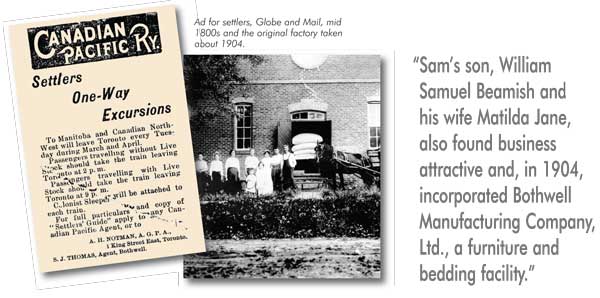
Sam settled in the right place at the right time, the northeastern corner of Kent County, then largely Indian land, almost, it was said, “in a state of nature”. It just so happened that a Scot by the name of George Brown, historically designated as one of the “Fathers of Canadian Confederation”, who had arrived in Canada a few years before, was the Leader of the Reform Party in the Assembly of Upper Canada. In building his personal business portfolio in 1851, he made some ambitious investments in land, more than 4,000 heavily timbered acres which were intersected by the brand new Great Western Railway in 1854. Brown’s forests supplied firewood for the London to Windsor stretch and, in 1855, the railway established a permanent wooding station around which Brown nurtured the growth of the village of Bothwell, incorporated as a town in 1866.
Perhaps one of Brown’s most important early assets was the Globe, now the Globe and Mail, Canada’s most successful and influential newspaper. He used the paper to advance the Reform cause, Toronto’s development and growth and to advertise for settlers to buy farm land and business sites in Bothwell and his adjacent properties. He oversaw the creation of a sawmill, grist mill, furniture factory, door and shingle plant, a foundry and a machine shop, sold those farm acreages and town lots, and built roads throughout the area. It was designed as a “region of frontier democracy, the pioneer farmer aspiring to independence”. Sam purchased a “goodly farm”, cleared the land and successfully raised crops and children and, with his wife Elizabeth, firmly established the identity and destiny of the Beamish dynasty.
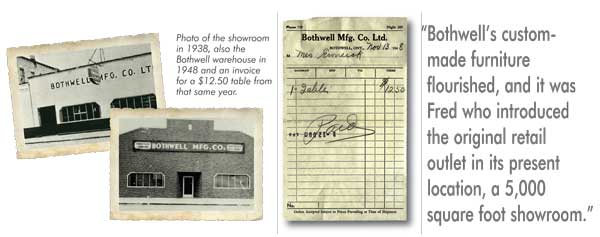
The new community prospered until it was affected by a general depression in 1857-1858. And then, as such things do sometimes happen, the luck of the Irish (and the Scots) manifested itself in Bothwell. The native peoples had been aware of the existence of oil in the region long before European settlement came to the North American continent. Moravian missionaries who settled in the early 1790s had used the oil in medications and liniments. In 1793, a group of Delaware Indians took Governor John Graves Simcoe to a “spring of petroleum along the banks of the Thames River”. But it wasn’t until 1861 that John Lick, an American, began drilling for oil. The Civil War was raging south of the border and the demand for oil was keen. And Bothwell became a boom town!
Fortunes inevitably were made and lost. When the Civil War was over, the price of oil dropped and, beginning in 1866, members of the U.S. Fenian Brotherhood attempted to raid British Army forts, customs posts and other targets not too far from the long border, their mission to bring pressure on Britain to withdraw from Ireland. Then, in 1867, a fire devastated Bothwell’s principal streets.
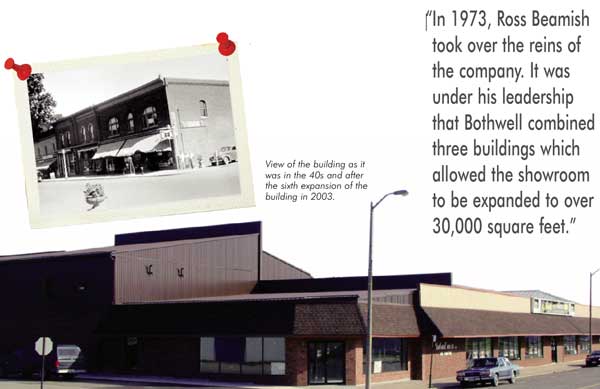
But the members of the Beamish family are survivors. Sam’s interests surged to embrace commercial developments on Bothwell’s Main Street, by 1876, “a number of small businesses and a two-storey hotel and livery”. It’s recorded in “Life of a Boomtown” by Marion Matt, that Sam “expanded the hotel by taking several small buildings and attached them to the hotel to provide a sample room for commercial travelers. Many stores were housed here”. And some time in the midst of all that activity, Sam found enough elbow room to serve as Warden of Kent County.
Sam’s son, William Samuel Beamish and his wife Matilda Jane, also found business attractive and, in 1904, incorporated Bothwell Manufacturing Company, Ltd., a furniture and bedding facility. Sixth generation Amanda Beamish told us, “He began making tick mattresses with a partner and a group of shareholders, starting the operation in the old Salvation Army facility. The business grew steadily during the early years and, when World War I started, the company handled a government contract for army cots as well as distributing to hospitals and hotels across Canada. The fact is, 40 employees handmade 500,000 mattresses in four years.” No mean accomplishment!
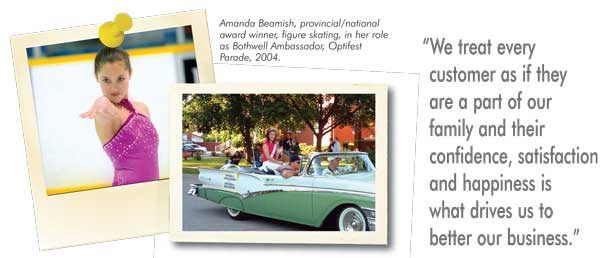
Amanda continued, “In 1917, William Fred Beamish, son of Sam, his sister, Agnes, and his wife Ethel, joined the business with his father. In the 1930s, Fred worked at both the manufacturing facility as well as the family owned hardware store. It was at the hardware store that Fred just happened to put a handmade chesterfield in the store window. It sold immediately. A true moment of birth of the furniture manufacturing enterprise. Bothwell’s custom-made furniture flourished, and it was Fred who introduced the original retail outlet in its present location, a 5,000 square foot showroom.”
In an interview conducted in 1978, William Ross Beamish, son of Fred, his wife another Elizabeth, shared some of his early memories with Marion Matt. She asked, “Your grandfather (Sam) also had the hardware?”
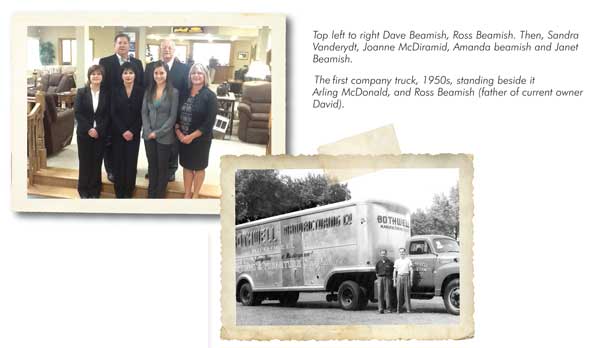
Ross’s answer, “Yes. It was on the west side of the Main Street of Bothwell where the druggist is now. . . . also we had a Pontiac Buick dealership in Bothwell, our charter is still registered.”
Marion, “Can you describe for me what it was like in the hardware?”
“It was two divisions, we sold stoves on one side and furniture and appliances on the other. The hardware was on one side of the partition and furniture on the other side. There was really very little furniture that I remember, maybe six or seven pieces. In this section, we sold RCA phonographs with the horn on the side. I was very, very small but Mother (Ethel) used to bring me into the store on Saturday nights. She would put cylinders on (records came later) and play them, and people would come into the store the same as you go into Radio Shack or someplace to buy a stereo today. First thing you know, the children would have to have that recording. Pretty soon there would be a group interested and listening to the recording. Then they would find out the price of the machine and buy the machine! She was on the same level as a disc jockey!
“The radios were at the back with the battery department. People brought their batteries in on a Saturday and we ran a battery charger at the back for 50 cents a week.
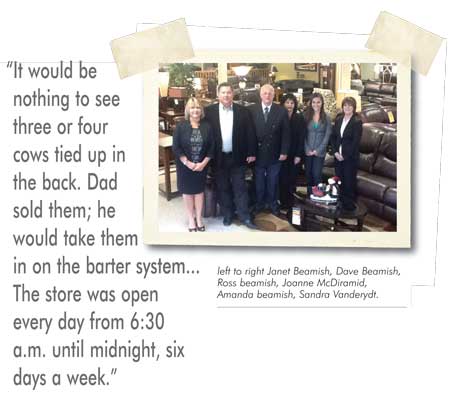
“Now back in 1934-38, people didn’t have much money. But we would take in a cow, take in 50 bushels of wheat. It would be nothing to see three or four cows tied up in the back. Dad sold them; he would take them in on the barter system.
“The store was open every day from 6:30 a.m. until midnight, six days a week.
“We delivered stoves and gas washing machines all over the whole country, one of the few outlets. In those days there was more respect towards each other. It wasn’t such a dog-eat-dog world. If they had a friendly gentleman’s agreement between them, they would live up to it. More honourable back in those days .
“I can remember when we went to the river swimming and we’d all get together, gas for the Model T was 25 cents a gallon, and all the candy and ice cream you could eat for another 25 cents!”
Back to Amanda’s story. “By the 1950s when Ross officially came into the business, they noticed it was getting to be more and more competitive with the suppliers. The larger companies were being formed, and they found they were able to buy much better than they could produce. Therefore, in 1974, the Beamish’s sold the factory, and began to concentrate strictly on retailing.”
In 1973, Ross Beamish took over the reins of the company. It was under his leadership that Bothwell Manufacturing Company Limited combined three buildings which allowed the showroom to be expanded to over 30,000 square feet. This involved removing walls to create one large area with suspended ceilings, recessed track and specialty lighting to give the furniture a more natural homelike setting. The transformation made it possible for all furnishings throughout the store to be placed in groupings complete with accessories and artwork.
“The warehouse was also modernized for quick access. A new employee door and encoded loading ramp permitted easier movement of goods in and out of the trucks in all kinds of weather. The back parking areas for the fleet of delivery trucks was enclosed with 10 foot high industrial fencing, increased lighting and security.
“In 1974, Ross’s son, fifth generation David Beamish, (and my Dad) began working at the company as an after school job, stapling mattresses, sweeping up and making deliveries in the summer.
“It was in 1991 that David took over control of the company. Under David’s leadership business flourished and with continuous growth, demanded a bigger warehouse facility. In 1995, a two story, 10,000 square foot distribution centre complete with shipping and receiving docks was constructed and, with this addition, the company became known for not only the quality and selection in their showroom but as well for their outstanding service department.
“The year 2004 marked our 100th anniversary and to celebrate, Bothwell Manufacturing Co. Limited added a 14,000 square foot addition to our showroom. In total, the store now covers 40,000 square feet (one whole block) making it one of southwestern Ontario’s largest furniture showrooms.
“In 2005, the company transformed 14,000 square feet of their showroom into a La-Z-Boy Comfort Studio, offering a wide selection of La-Z-Boy furniture. Just recently, the company made the decision to transition the company name from Bothwell Manufacturing Co. Limited to Bothwell Furniture as a way to avoid the misconception that we were still in the manufacturing business.
“Today, Dave’s management staff consists of his wife, Janet, sisters Sandra Vanderydt and Joanne McDiarmid and daughter Amanda (me!) have also entered into the business. In total, there are 10 employees in sales, service and delivery.” We asked Amanda to enlarge on family responsibilities.
“Janet and Sandra work in administration. They work together to make sure each order is correctly ordered and transmitted, and they monitor each custom order to allow for timely delivery to the customer. Their friendly and positive attitudes are a great addition to our customer service department as they speak to each customer directly and answer their questions as quickly as possible.
“Joanne is responsible for how great our showroom looks. She takes a passion in maintaining the store and keeps our showroom and furniture displays looking spotless. She is also one of our top sales people. Her enthusiasm and helpful nature make her a great addition to the store.
“Our staff is largely composed of family members and I have to say this is one reason we are so successful. This company is very close to our hearts. We’ve grown up in this business. And with that being said, we take a real personal approach to our business. We treat every customer as if they are a part of our family and their confidence, satisfaction and happiness is what drives us to better our business. We do it for them.”
Amanda tells us that she maintains the website, is “getting into sales” and obviously she fills the role of director of communications! She has spent some time of her own in the limelight, not only in her home town. She began her sporting career in figure skating at the age of five and proceeded to win a long list of awards both recreational (12 gold medals, five silver and six bronze) and in high level competition (many provincial and national championships) between 1998 and 2005. Now Amanda is a certified skating coach. She has been teaching “skaters of all ages and levels for the past six years. I teach ‘learn to skate’ sessions as well as private students”.
We questioned the Beamish clan about their “eureka moment”. The reply, “Our survival strategy since 1904 has always been ‘When times get tough – the tough get going’. Our motto, ‘Quality, Service and Dependability’, has always given us a competitive edge within the furniture industry, and the realization that inventory control is the forefront of delivering that message has been ‘the eureka moment’ of our company. We believe it is of the upmost importance to purchase the right product – at the right time – at the right price – it all has to make sense. We are consistently comparing the quality of the economy to the need for inventory control and we find this ensures that we are always able to offer the guaranteed lowest price on all our furniture products. We realize that customers’ demands are greater during recessions than any other time. Our customers work hard for their dollar and want to choose a store that offers better quality, better service and better selection with the guarantee that their purchase will be looked after from the time of the purchase to years after their delivery has been made.
“You asked if there had been a ‘special time’ for us, and at Bothwell Furniture we believe the turning point in the history of our operation can be dated back to 1974 when the decision was made to sell the manufacturing plant and focus strictly on furniture retail. This transition can also be counted as one of our ‘eureka moments’ as we came to the realization that it would be more cost-effective for the company to purchase furniture from other distributors than to manufacture our own. We had earned a reputation for building a quality product and, during the transition from manufacturing to retail, Bothwell Furniture knew that whether or not they were constructing furniture or buying it, when customers think of us they think of a quality product and that was a reputation we wanted to maintain. We are also proud to say that with over two million dollars’ worth of showroom inventory, 80 per cent is constructed by Canadian manufacturers.”
The question was, “the issue, cause or policy that stands out among all others that ensured the success of Bothwell Furniture, and benefited your customers and your community?”, and Amanda answered, “When people think of Bothwell Furniture we believe they think of three major company components, ‘Quality Furniture, Customer Service & Dependability in the Product. They Have Purchased’. We believe our customers can feel confident in our company from the moment they enter our store to long after their delivery has been made. All the steps in the process of the sale are equally as important to us, and customer satisfaction is our number one priority. Our management consists of established, long-term employees who enjoy what they are doing and work together to ensure the customer is more than satisfied with their purchase.
Bothwell Furniture proves that our company does more for you by providing free set-up and blanket-wrapped delivery, a 10,000 square foot warehouse facility, on-site repairs and a customer service team willing and able to answer any questions or concerns our customers may have. We believe that the memory of the experience will bring our customers back time and time again. Our concern and desire to please our customers has been one of our key factors for surviving 108 years under the same family – it’s in our history and will be prevalent in our future.”
When we think back to Amanda’s great grandmother Ethel , the forward-thinking disc jockey, a promotional wizard long before her time, we have to recognize the family’s in-born marketing instincts! Amanda believes, “Our most successful promotion was our 100th Anniversary sale. We had a lot of give-a-ways – we gave out a whole living room for one raffle! We raffled off a lot of furniture during this promotion as a way to thank our customers for helping us achieve this milestone. This promotion was unlike any other we have ever had as it was a 100 years in the making!”
Bothwell is a busy town and centre of new growth, and Bothwell Furniture is “very passionate about outreaching and supporting our local community. We believe that it is important for our business to support local organizations.” Their involvement includes “the local Bothwell Figure Skating Club, the local hockey teams, (Bothwell Minor Hockey League), local school (Zone Township Central School), and the United Way. And we lend out our delivery trucks for local events like the Old Auto’s Car Show,” she told us.
The future? “We have established ourselves as a quality destination store, selling quality furniture at affordable prices, and we want to continue that legacy into the future. We are here to service our customers – the customers come first, therefore, we will continue to listen to their wants and needs into the future.
“If we feel that our customers would like the option to online shop – we will make that happen for them. We are willing to grow with the times but we will always remember our history and what Bothwell Furniture has become known for and bring that legacy into the future.”
Note: At some point Furniture World readers might have become curious about the use of the name “William” in each generation. Explained by Amanda, the first born son has traditionally been given this name. Her father, David, now owner of the family business, is Ross and Elizabeth’s second son. (Number one is William Douglas Beamish, a lawyer who practices in Toronto.)
We are grateful to Marion Matt, author, entrepreneur, 1995 to 1998 Reeve of Bothwell, for her generous and warm contribution to the history of the Beamish family and the town of Bothwell. We have quoted from her 1978 interview of Ross Beamish to be found in her “Life of a Boomtown – A Pictorial History of Bothwell”, and most of the photographs, both vintage and current, are contained in that same volume. Many thanks, Marion!
More information about Bothwell and district’s early history was extracted from an article entitled “Bothwell and Kent’s First Oil Boom” by journalist Victor Lauriston, 1881-1973.
Janet Holt-Johnstone is retail editor at Furniture World Magazine.